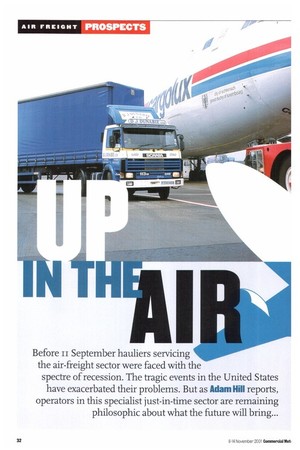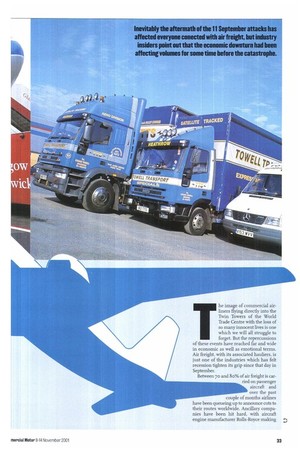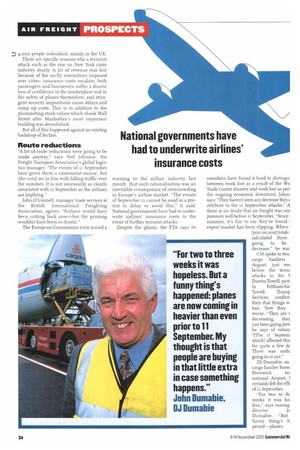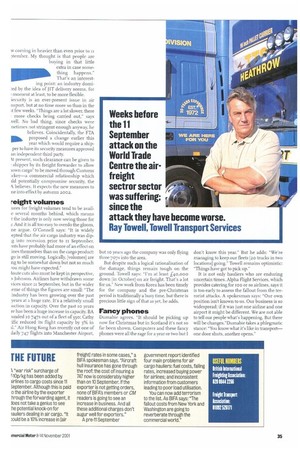Before II September hauliers servicing the air-freight sector were faced
Page 32

Page 33

Page 34

Page 35

If you've noticed an error in this article please click here to report it so we can fix it.
with the spectre of recession. The tragic events in the United States
have exacerbated their problems. But as Adam Hill reports,
operators in this specialist just-in-time sector are remaining philosophic about what the future will bring...
The image of commercial airliners flying directly into the Twin Towers of the World Trade Centre with the loss of so many innocent lives is one which we will all struggle to forget. But the repercussions of these events have reached far and wide in economic as well as emotional terms. Air freight, with its associated hauliers, is just one of the industries which has felt recession tighten its grip since that day in September.
Between 7o and So% of air freight is carried on passenger aircraft and over the past couple of months airlines have been queueing up to announce cuts to their routes worldwide. Ancillary companies have been hit hard, with aircraft engine manufacturer Rolls-Royce making
4,000 people redundant, mainly in the UK. There are specific reasons why a terrorist attack such as the one on New York costs industry dearly. A lot of revenue was lost because of the no-fly restrictions imposed over cities; insurance costs escalate; both passengers and businesses suffer a drastic loss of confidence in the marketplace and in the safety of planes themselves: and stringent security impositions cause delays and ramp up costs. This is in addition to the plummeting stock values which shook Wall Street after Manhattan's most important building was demolished. But all of this happened against an existing backdrop of decline.
Route reductions
"A lot of route reductions were going to be made anyway," says Neil Johnson, the Freight Transport Association's global logistics manager. "The events of ii September have given them a convenient excuse, but [the cuts] are in line with falling traffic over the summer. It is not necessarily as clearly associated with II September as the airlines are implying." John O'Connell, manager, trade services at the British International Freighting Association, agrees: "Airlines would have been cutting back now—but the pruning wouldn't have been so drastic."
The European Commission even issued a
warning to the airline industry last month that such rationalisation was an inevitable consequence of overcrowding in Europe's airline market. "The events of September Tr cannot be used as a pretext to delay or avoid this," it said. National governments have had to underwrite airlines' insurance costs in the event of further terrorist attacks.
Despite the gloom, the FTA says its members have found it hard to distingu between work lost as a result of the Wo Trade Centre disaster and work lost as pall the ongoing economic downturn. Johns says: "They haven't seen any decrease they attribute to the ii September attacks." A there is no doubt that air freight was um pressure well before u September. "Since I summer, it's fair to say they've found 1 export market has been slipping. When
year on year] totals calculated there
going to be decrease," he war CM spoke to two cargo hauliers August, just we before the terra attacks in the I. Darren Towel, part:
in Feltharm-ba!
Towell Transp
Services, confirmthen that things w bad, Now they worse. 'They are 5 decreasing, they just been going dow he says of volurn "[The TT Septeml attack] affected thil for quite a few da There was noth: going in or out." DJ Dumabie, an cargo haulier basec Prestwick ml national Airport, I certainly felt the effe of 11 September.
"For two to th weeks it was ho less," says manag
director Jc Durnabie. "But funny thing's h
pened planes w coming in heavier than even prior to si Dtember. My thought is that people are buying in that little extra in case something happens." That's an interesting point: an industry domi:ed by the idea of JIT delivery seems, for ; moment at least, to be more flexible. ;ecurity is an ever-present issue in air nsport, but at no time more so than in the >t few weeks. "Things are a lot slower, there more checks being carried out," says veil. No bad thing, since checks were netimes not stringent enough anyway, he believes, Coincidentally, the FTA proposed a change earlier this year which would require a shipper to have its security measures approved an independent third party.
sa present, such clearance can be given to shipper by its freight forwarder to allow iown cargo" to be moved through Customs cker—a commercial relationship which ild potentially compromise security, the As believes. It expects the new measures to ne into effect by autumn 2002.
reight volumes
,ures for freight volumes tend to be availe several months behind, which means t the industry is only now seeing those for v. And it is all too easy to overdo the gloom, ne argue. O'Connell says: "It is widely epted that the air cargo industry was dip.g into recession prior to is September. !nts have probably had more of an effect on ines themselves than on the cargo product: go is stilt moving. Logically, [volumes] are ng to be somewhat down but not so much rou might have expected."
toute cuts also must be kept in perspective, s Johnson. Airlines have withdrawn some vices since is September, but in the wider .erne of things the figures are small: The industry has been growing over the past years at a huge rate. It's a relatively small uction in capacity. Over the past so years re has been a huge increase in capacity. BA sinded so 747s out of a fleet of 350; Cathy :ific reduced its flight capacity by 3% in ii." Air Hong Kong has recently cut one of daily 747 flights into Manchester Airport, but so years ago the company was only flying three 7075 into the area.
But despite such a logical rationalisation of the damage, things remain tough on the ground. Towell says: "I'm at least £40,000 down [in October] on air freight. That's a lot for us." New work from Korea has been timely for the company and the pre-Christmas period is traditionally a busy time, but there is precious little sign of that as yet, he adds.
Fancy phones
Dumabie agrees. It should be picking up now for Christmas but in Scotland it's not so far been shown. Computers and these fancy phones were all the rage for a year or two but I
don't know this year." But he adds: "We're managing to keep our fleets [20 trucks in two locations] going." Towell remains optimistic: "Things have got to pick up."
It is not only hauliers who are enduring uncertain times. Alpha Flight Services, which provides catering for sop or so airlines, says it is too early to assess the fallout from the terrorist attacks. A spokesman says: "Our own position isn't known to us. Our business is so widespread; if it was just one airline and one airport it might be different. We are not able to tell our people what's happening. But there will be changes."Dumabie takes a phlegmatic stance: "You know what it's like in transport— one door shuts, another opens."












































































































































